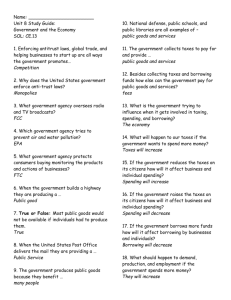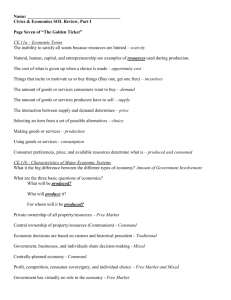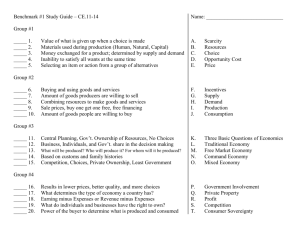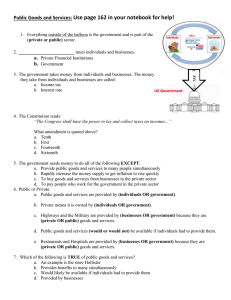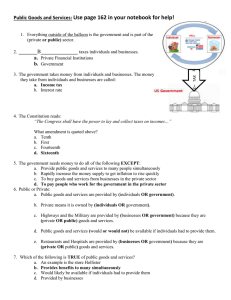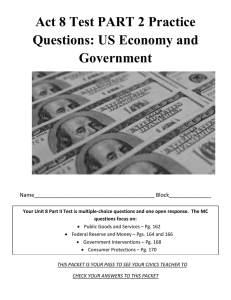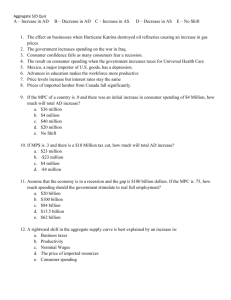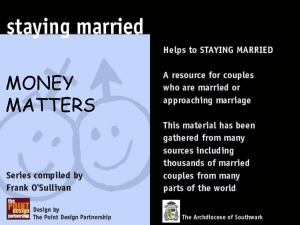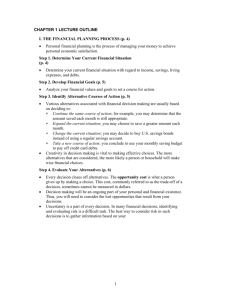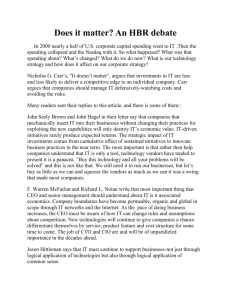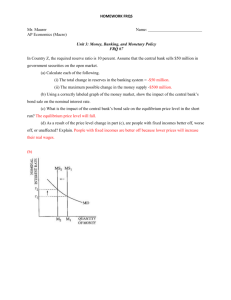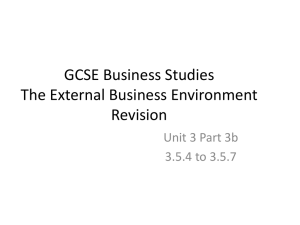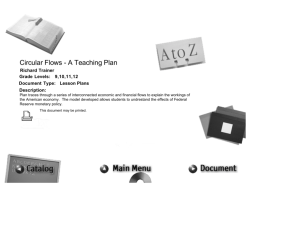CE.13 Study Guide
advertisement
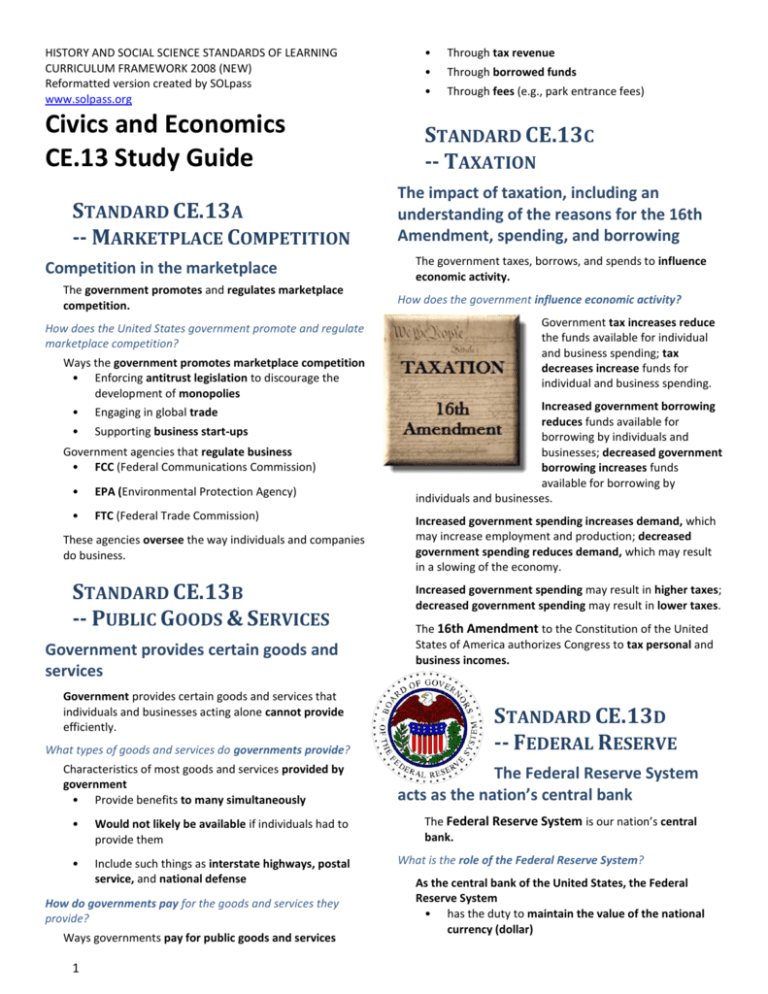
HISTORY AND SOCIAL SCIENCE STANDARDS OF LEARNING CURRICULUM FRAMEWORK 2008 (NEW) Reformatted version created by SOLpass www.solpass.org Civics and Economics CE.13 Study Guide STANDARD CE.13A -- MARKETPLACE COMPETITION Competition in the marketplace The government promotes and regulates marketplace competition. How does the United States government promote and regulate marketplace competition? Ways the government promotes marketplace competition • Enforcing antitrust legislation to discourage the development of monopolies • Engaging in global trade • Supporting business start-ups Government agencies that regulate business • FCC (Federal Communications Commission) • EPA (Environmental Protection Agency) • FTC (Federal Trade Commission) These agencies oversee the way individuals and companies do business. STANDARD CE.13B -- PUBLIC GOODS & SERVICES Government provides certain goods and services Government provides certain goods and services that individuals and businesses acting alone cannot provide efficiently. What types of goods and services do governments provide? Characteristics of most goods and services provided by government • Provide benefits to many simultaneously • Would not likely be available if individuals had to provide them • Include such things as interstate highways, postal service, and national defense How do governments pay for the goods and services they provide? Ways governments pay for public goods and services 1 • Through tax revenue • Through borrowed funds • Through fees (e.g., park entrance fees) STANDARD CE.13C -- TAXATION The impact of taxation, including an understanding of the reasons for the 16th Amendment, spending, and borrowing The government taxes, borrows, and spends to influence economic activity. How does the government influence economic activity? Government tax increases reduce the funds available for individual and business spending; tax decreases increase funds for individual and business spending. Increased government borrowing reduces funds available for borrowing by individuals and businesses; decreased government borrowing increases funds available for borrowing by individuals and businesses. Increased government spending increases demand, which may increase employment and production; decreased government spending reduces demand, which may result in a slowing of the economy. Increased government spending may result in higher taxes; decreased government spending may result in lower taxes. The 16th Amendment to the Constitution of the United States of America authorizes Congress to tax personal and business incomes. STANDARD CE.13D -- FEDERAL RESERVE The Federal Reserve System acts as the nation’s central bank The Federal Reserve System is our nation’s central bank. What is the role of the Federal Reserve System? As the central bank of the United States, the Federal Reserve System • has the duty to maintain the value of the national currency (dollar) • regulates banks to ensure the soundness of the banking system and the safety of deposits • manages the amount of money in the economy to try to keep inflation low and stable • acts as the federal government’s bank. STANDARD CE.13E -- CONSUMER & PROPERTY RIGHTS The protection of consumer rights and property rights The United States government passes laws and creates agencies to protect consumer rights and property rights. What is the role of the United States government in protecting consumer rights and property rights? Individuals have the right of private ownership, which is protected by negotiated contracts that are enforceable by law. Government agencies establish guidelines that protect public health and safety. Consumers may take legal action against violations of consumer rights. STANDARD CE.13F --MONEY Government creates currency and coins; there are additional forms of money Money is defined as anything that is generally accepted as a method of payment. Why does the government issue currency and coins? Which government agencies are responsible for creating money? When the United States government issues coins and currency, people accept it in exchange for goods and services because they have confidence in the government. Government issues money to facilitate this exchange. The three types of money generally used in the United States are • coins • Federal Reserve notes (currency) • deposits in bank accounts that can be accessed by checks and debit cards. 2 STANDARD CE.14 -- CAREERS & FINANCES a) talents, interests, and aspirations that influence career choice; b) attitudes and behaviors that strengthen the individual work ethic and promote career success; c) abilities, skills, and education and the changing supply and demand for them in the economy; d) the impact of technological change and globalization on career opportunities; e) the importance of education to lifelong personal finances; f) the financial responsibilities of citizenship, including evaluating common forms of credit, savings, investments, purchases, contractual agreements, warranties, and guarantees. What is the role of self-assessment in career planning? An awareness of personal talents, interests, and aspirations is needed to select a career. Career planning starts with self-assessment. What is the role of work ethic in determining career success? Attitudes and behaviors that support a strong work ethic enhance career success. Employers seek employees who demonstrate the attitudes and behaviors of a strong work ethic. What is the relationship among skills, education, and income? There is a correlation among skills, education, and income. Higher skill and/or education levels generally lead to higher incomes. Supply and demand also influence job income. Employers seek individuals who have kept pace with technological changes by updating their skills. What influence do advances in technology have on the workplace? Changes in technology influence the abilities, skills, and education needed in the workforce. Technological advancements create new jobs in the workplace. Technology and information flows permit people to work across international borders. This creates competition from foreign workers for United States jobs but also may create opportunities for United States workers to work for companies based in other countries. Being fiscally responsible includes making careful spending decisions, saving and investing for the future, having insurance, keeping to a budget, using credit wisely, as well as understanding how contracts, warranties, and guarantees can protect the individual.
